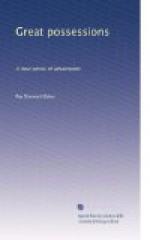As for Horace is he convinced that he is an impractical dreamer. Not a bit of it! He was merely flurried for a moment in his mind, and probably thinks me now, more than ever before, just what I think him. Absurd place, isn’t it, this world?
So I reached home at last. You have no idea, unless you have tried it yourself, how good breakfast tastes alter a three-mile tramp in the sharp morning air. The odour of ham and eggs, and new muffins, and coffee, as you come up the hill, there is an odour for you! And it was good to see Harriet.
“Harriet,” I said, “you are a sight for tired eyes.”
CHAPTER IV
THE GREEN PEOPLE
I have always had a fondness, when upon my travels about the world of the near-by woods and fields, for nipping a bit of a twig here and there and tasting the tart or bitter quality of it. I suppose the instinct descends to me from the herbivorous side of my distant ancestry. I love a spray of white cedar, especially the spicy, sweet inside bark, or a pine needle, or the tender, sweet, juicy end of a spike of timothy grass drawn slowly from its close-fitting sheath, or a twig of the birch that tastes like wintergreen.
I think this no strange or unusual instinct, for I have seen many other people doing it, especially farmers around here, who go through the fields nipping the new oats, testing the red-top, or chewing a bit of sassafras bark. I have in mind a clump of shrubbery in the town road, where an old house once stood, of the kind called here by some the “sweet-scented shrub,” and the brandies of it nearest the road are quite clipped and stunted I’m being nipped at by old ladies who pass that way and take to it like cat to catnip.
For a long time this was a wholly unorganized, indeed all but unconscious, pleasure, a true pattern of the childish way we take hold of the earth; but when I began to come newly alive to all things as I have already related—I chanced upon this curious, undeveloped instinct.
“What is it I have here?” I asked myself, for I thought this might be a new handle for getting hold of nature.
Along one edge of my field is a natural hedge of wild cherry, young elms and ashes, dogwood, black raspberry bushes and the like, which has long been a pleasure to the eye, especially in the early morning when the shadows of it lie long and cool upon the meadow. Many times I have walked that way to admire it, or to listen for the catbirds that nest there, or to steal upon a certain gray squirrel who comes out from his home in the chestnut tree on a fine morning to inspect his premises.
It occurred to me one day that I would make the acquaintance of this hedge in a new way; so I passed slowly along it where the branches of the trees brushed my shoulder and picked a twig here and there and bit it through. “This is cherry,” I said; “this is elm, this is dogwood.” And it was a fine adventure to know old friends in new ways, for I had never thought before to test the trees and shrubs by their taste and smell. After that, whenever I passed that way, I closed my eyes and tried for further identifications by taste, and was soon able to tell quickly half a dozen other varieties of trees, shrubs, and smaller plants along that bit of meadow.




